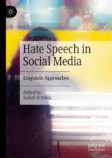Search
Search Results
-
Assessing linguistic generalisation in language models: a dataset for Brazilian Portuguese
Much recent effort has been devoted to creating large-scale language models. Nowadays, the most prominent approaches are based on deep neural...

-
Computational Terminology
This chapter introduces the reader to the concept of computational terminology, i.e., to automatic ways of managing domain-specific vocabulary. The...
-
The Good, the Bad, and the Yucky: Valenced Linguistic Intuitions and Linguistic Methodology
Linguistic intuitions are a central source of evidence for linguistic claims. One under-appreciated feature of linguistic intuition is its normative...
-
The Extraction of Linguistic Knowledge and Construction of Linguistic Resources
In recent years, our research team has completed a series of studies and established a cognition-based, computation-oriented linguistic approach and...
-
Linguistic Gender Forms and Deontic Modality in Islamic Legal Translation: A Corpus-Based Study
Islamic legal discourse is mainly developed by men, particularly in communities that many assume they are male-dominated. The study seeks to explore...
-
Linguistic annotation of Byzantine book epigrams
In this paper, we explore the feasibility of develo** a part-of-speech tagger for not-normalised, Byzantine Greek epigrams. Hence, we compared...

-
Human-inspired computational models for European Portuguese: a review
This paper surveys human-inspired speech technologies developed for European Portuguese and the computational models they integrate and made them...

-
Pragmatic evaluations of automated linguistic creativity
The optimal innovation hypothesis (OIH) offers a good aesthetic and cognitive reference for the kind of linguistic creativity where minimal...

-
Computational Linguistics
This chapter first summarizes the contributions of Systemic Functional Linguistics (SFL) to computational linguistics. It elaborates on Martin Kay’s...
-
A Novel Probabilistic Approach to Linguistic Imprecision
A key fact about linguistic communication is that utterances are often produced imprecisely by speakers and interpreted imprecisely by listeners....
-
Linguistic resources for paraphrase generation in portuguese: a lexicon-grammar approach
This paper presents a new linguistic resource for the generation of paraphrases in Portuguese, based on the lexicon-grammar framework. The resource...

-
Weak determinism and the computational consequences of interaction
Recent work has claimed that (non-tonal) phonological patterns are subregular (Heinz
2011a ,b ,2018 ; Heinz and Idsardi2013 ), occupying a delimited...
-
Fighting Cybercrime through Linguistic Analysis
This chapter explores the phenomenon of cybercrime from a linguistic perspective. In particular, the case of romance scams is investigated to gain a...
-
Linguistic Markers of Affect and the Gender Dimension in Online Hate Speech
Language is not only a tool for information transfer but also a vehicle of the producer’s subjectivity which adds to the persuasive power of the...
-
Translation as a Linguistic Process
In this chapter, we first elaborate on the significance of applying Systemic Functional Linguistics (SFL) to translation studies. We also discuss...
-
Linguistic Feeling: A Relational Approach Incorporating Epistemology, Theories of Language, and Human-Machine Interaction
This chapter is devoted to the remarkable, complex, and kaleidoscopic concept of linguistic feeling, which we explore from various scientific...
-
Development of the Ontologization Theory: From Greek Philosophy to Computational Linguistics
Ontology is a convenient way of knowledge management and generates considerable interest in linguistic data management. In computational linguistics,...
-
Computational Modeling
This chapter briefly describes finite-state automata, finite-state transducers and regular expressions before focusing on the architecture of the...
-
Extending the Study of Style of Literary Translation to Extra-Linguistic Features
This chapter discusses how literary style in narrative prose or poetry is defined (or not defined) in the relevant critical literature aimed at...
